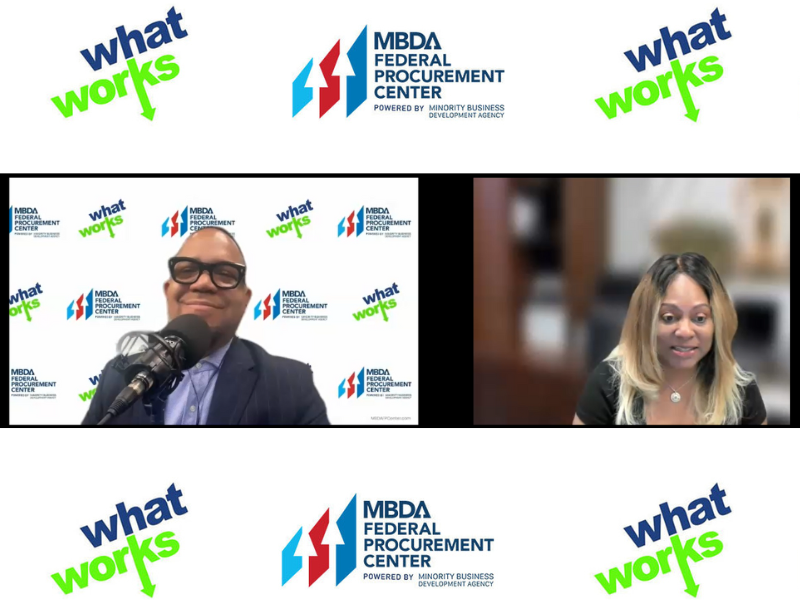What Works Financially: Accessing Capital and Resources
For Small, Emerging, and Minority-Owned Businesses (MBEs), securing capital and financial resources is crucial to thriving in the competitive landscape of Government contracting. Access to the right financial support can make the difference between success and struggle. This article explores various funding options and financial resources available to MBEs, ensuring they have the necessary support for Government contracting ventures, and encourages you and your business to join our 12-week online Accelerator Growth Innovation and Resiliency 12 week - online training program. Maleeka Catron, the MBDA Program Director at National Minority Supplier Diversity Council shares:
"Empowering MBEs for Government contracting success requires strategic readiness enablement tools, access to networks, access to capital and robust financial resources. By leveraging diverse funding options and connecting MBEs to accessible resources through programs like the 12- Week Best in Practices Government Incubator Cohort at the NMSDC MBE Center for Accelerated Growth Innovation and Resiliency (A Capital Readiness Program Funded by the MBDA), MBEs can build the financial strength and market position needed to thrive in the competitive government contracting landscape. We know the journey may be challenging, but the potential for MBE growth and economic empowerment outweighs those challenges for those who take advantage of these opportunities."
Understanding the Financial Landscape for MBEs
Navigating the financial landscape for MBEs can be challenging, but understanding the options available is the first step toward success. MBEs often face unique hurdles, such as limited access to traditional bank loans, lack of collateral, and stringent credit requirements. However, several alternative funding options and resources can bridge these gaps.
Traditional Bank Loans
Traditional bank loans are a common financing option for businesses. While securing a loan from a bank may be challenging for some MBEs due to credit history or lack of collateral, it remains a viable option for those who meet the criteria. Establishing a strong business plan, maintaining a good credit score, and developing a solid relationship with your bank can improve your chances of obtaining a loan.
Small Business Administration (SBA) Loans
The Small Business Administration offers various loan programs specifically designed to support small businesses, including MBEs. SBA loans typically have more favorable terms than traditional bank loans, such as lower interest rates and longer repayment periods. The most popular SBA loan programs include:
- SBA 7(a) Loan Program: Provides financial assistance for a wide range of business purposes, including working capital, equipment purchase, and debt refinancing.
- SBA 504 Loan Program: Offers long-term, fixed-rate financing for major fixed assets, such as land and buildings.
- SBA Microloan Program: Provides small loans of up to $50,000 to help small businesses and certain not-for-profit childcare centers start and expand.
Community Development Financial Institutions (CDFIs)
Community Development Financial Institutions are specialized organizations that provide financial services in low-income communities and to people who lack access to financing. CDFIs offer a range of financial products, including loans, microloans, and lines of credit. These institutions often have more flexible lending criteria than traditional banks and can be a valuable resource for MBEs seeking funding.
Venture Capital and Angel Investors
For MBEs with high-growth potential, venture capital and angel investors can provide substantial funding. Venture capital firms invest in businesses in exchange for equity, often bringing industry expertise and networking opportunities. Angel investors are typically affluent individuals who invest their own money in startups and small businesses. While these funding sources can provide significant capital, they also come with the expectation of high returns and potential involvement in business decisions.
Crowdfunding
Crowdfunding has emerged as a popular alternative for raising capital, especially for innovative and community-oriented projects. Platforms like Kickstarter, Indiegogo, and GoFundMe allow businesses to raise small amounts of money from a large number of people. Successful crowdfunding campaigns not only provide funding but also validate your business idea and create a loyal customer base.
Grants and Government Programs
Various grants and Government programs are available to support MBEs. These programs often provide funding without the need for repayment, making them an attractive option. Some notable programs include:
- Small Business Innovation Research (SBIR) Program: Provides funding for research and development projects with the potential for commercialization.
- Small Business Technology Transfer (STTR) Program: Similar to SBIR, this program funds research and development projects but requires collaboration with research institutions.
- Minority Business Development Agency (MBDA) Grants: Offers grants to support minority-owned businesses in various industries.
The State Small Business Credit Initiative (SSBCI) is a nearly $10 billion program to support small businesses and entrepreneurship in communities across the United States by providing capital and technical assistance to promote small business stability, growth, and success. SSBCI represents a transformational investment in American small businesses and is expected to catalyze up to $10 of private investment for every $1 of SSBCI Capital Program funding to increase access to capital to small businesses and entrepreneurs, including those in underserved communities.
Leveraging Financial Resources for Government Contracting
Securing financial resources is essential for MBEs aiming to succeed in Government contracting. Beyond traditional funding sources, several specialized resources are tailored to support businesses in this sector.
Government Contract Financing
Government contracts often involve significant upfront costs, such as purchasing materials, hiring additional staff, or covering other operational expenses. Various financing options are available to help MBEs manage these costs:
- Contract Financing Loans: Offered by financial institutions, these loans provide upfront capital based on the value of a Government contract. They help businesses cover initial expenses and maintain cash flow until payment from the Government is received.
- Line of Credit: Establishing a line of credit with a bank can provide the flexibility needed to manage the cash flow demands of Government contracts. This revolving credit allows businesses to draw funds as needed and repay them over time.
Invoice Factoring
Invoice factoring is a financial solution where a business sells its outstanding invoices to a factoring company at a discount. This provides immediate cash flow, allowing the business to continue operations and take on new projects without waiting for clients to pay their invoices. For MBEs engaged in Government contracting, factoring can be particularly beneficial due to the often lengthy payment cycles of Government agencies.
Surety Bonds
Many Government contracts require surety bonds, which are guarantees that the contractor will fulfill the terms of the contract. Obtaining a surety bond can be challenging for small businesses, but several programs are designed to assist MBEs:
- SBA Surety Bond Guarantee Program: This program helps small businesses obtain the bonding they need to compete for Government contracts by providing guarantees to surety companies, reducing their risk.
- Private Surety Bond Providers: Several private companies specialize in providing surety bonds to small businesses and MBEs, often with more flexible criteria than traditional providers.
Building Financial Strength
Beyond securing initial funding, building long-term financial strength is crucial for the sustainability and growth of MBEs. Here are some strategies to enhance financial stability and resilience:
Financial Planning and Management
Effective financial planning and management are the foundation of a successful business. Developing a comprehensive financial plan that includes budgeting, forecasting, and cash flow management is essential. Regularly reviewing financial statements and adjusting strategies based on performance can help MBEs stay on track and make informed decisions.
Strengthening Creditworthiness
Maintaining a strong credit profile is vital for accessing various funding options. MBEs should focus on building and maintaining good credit by:
- Paying Bills on Time: Timely payments on all bills, including loans and credit cards, help build a positive credit history.
- Managing Debt Levels: Keeping debt levels manageable and avoiding over-leveraging is crucial for maintaining financial health.
- Monitoring Credit Reports: Regularly checking credit reports for accuracy and addressing any discrepancies promptly can prevent issues that might affect creditworthiness.
Diversifying Revenue Streams
Relying on a single source of revenue can be risky. Diversifying revenue streams by exploring new markets, offering additional products or services, and expanding customer bases can provide financial stability and reduce dependence on any one source of income.
Utilizing Financial Advisory Services
Seeking advice from financial advisors, accountants, and other professionals can provide valuable insights and strategies for managing finances effectively. Many organizations and programs offer financial advisory services specifically tailored to MBEs, helping them navigate financial challenges and capitalize on opportunities.
Empowering MBEs for Government Contracting Success
Accessing capital and financial resources is critical for MBEs aiming to succeed in Government contracting. By exploring various funding options, leveraging specialized resources, and building long-term financial strength, MBEs can position themselves for success in this competitive arena.
The journey to securing financial resources may be challenging, but the opportunities for growth and success are immense. MBEs that proactively seek out and utilize available resources will be better equipped to navigate the complexities of Government contracting and achieve their business goals.
For more information on accessing capital and resources, and to explore additional support for your Government contracting ventures, enroll in the Capital Readiness Program Today at- https://nmsdc.org/programs/mbe-center-for-accelerated-growth-innovation-and-resiliency/resource-portal-registration-form/







